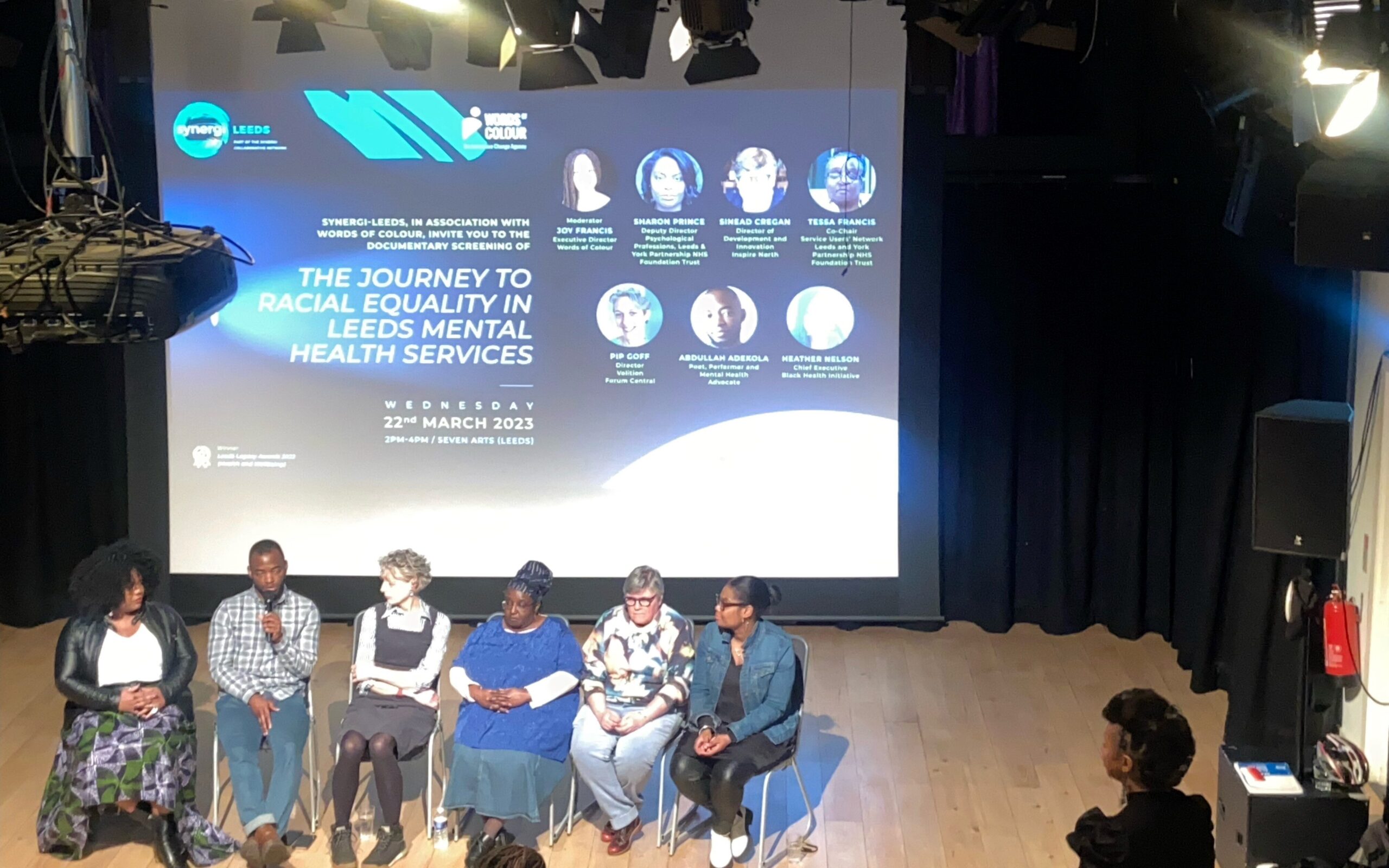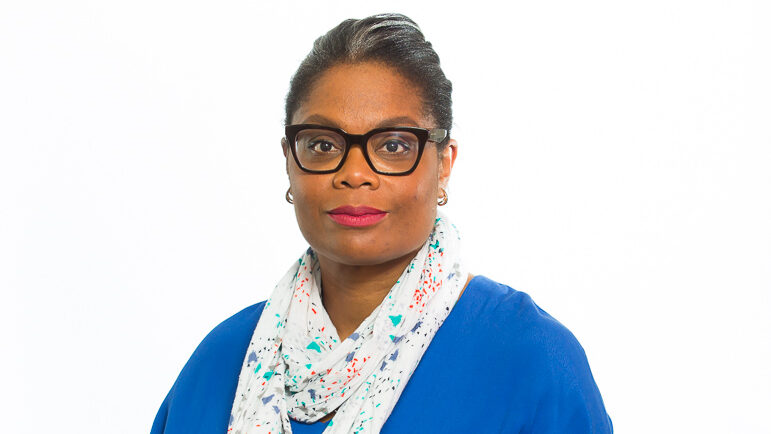Quick read
Synergi-Leeds Partnership aims to tackle mental health problems that affect people from different ethnic backgrounds. The group is made up of people from different sectors, such as health and care, and they are working together to reduce the number of people with mental health problems who are treated unfairly.
They have made a film called ‘The Journey to Racial Equality in Leeds Mental Health Service’. The film features interviews with people who work in health, mental health, public health and communities. They talk about how they are trying to help people with mental health problems from ethnic communities.
Sharon Prince is the chair of the group. She says the film is a good way to show what they are doing and to help other people learn from them. The group started because a study showed that more people from ethnic communities were taken to hospital for mental health problems. The group is working with others to make a difference. They want to help people with mental health problems get the support they need.
They also want to help people with other problems, such as poverty and neglect. The group has held meetings, given money to community groups and held events where people can be creative and share their ideas. They hope that their work will help more people from ethnically diverse communities get the support they need. They also hope that it will help to change the way people think about mental health.

An ambitious Leeds-wide partnership formed to tackle mental health inequalities in ethnically diverse communities has showcased its innovative work to the city’s health leaders – as it gears up for a busy and exciting year ahead.
Health and care partners from across all sectors were invited to a special screening of a documentary which aimed to shine a spotlight on the work so far of the Synergi-Leeds Partnership.
The film, called ‘The Journey to Racial Equality in Leeds Mental Health Service’, is described as “a powerful tribute to the work of the partnership and its contribution to supporting the city’s priorities of reducing health inequalities and making Leeds a mentally healthy city for all”.
It features interviews with local health, mental health, public health and community sector professionals and experts by experience who are all working to influence and impact organisations and communities in Leeds on tackling inequalities in mental health for BME communities.
Watch the trailer
Trailer: The Journey to Racial Equality in Leeds Mental Health Services’ from Words Colour on Vimeo.
Sharon Prince, chair of the Synergi-Leeds Partnership, who is also a consultant clinical and forensic psychologist, and Deputy Director of Psychological Professions at Leeds and York Partnership Foundation Trust (LYPFT), told MindWell that, as well as publicising the work of the partnership so far, she hopes the film will also become a valuable resource for all.
“It was about showcasing and highlighting the journey that all of us have been on to tackle the intractable problem of racial inequality in mental health services.
“I think it’s a good resource – it chronicles where we are at this moment in time. It showcases some really wonderful spoken word and powerful testimony,” Sharon said.

The Synergi-Leeds Partnership evolved after analysis conducted by Touchstone and LYPFT in 2017 indicated there was an over-representation of people from Black, Asian and Mixed Ethnic backgrounds detained to mental health wards – a finding consistent with many UK cities and one which led to a commitment within Leeds to make a change.
Sharon said, with the help of the national Synergi Collaborative Centre, Synergi-Leeds was launched in recognition of the need to “do something different” to address the problem.
It is now a growing network – supported by a small core team – of health and social care, statutory and voluntary sector organisations committed to reducing ethnic inequalities in mental health, focusing on reducing Mental Health Act detentions.
“I think we need to embrace the complexity of people’s lives and how they came to be in services – and ask people what they need’.
Sharon Prince, chair of the Synergi-Leeds Partnership and Deputy Director of Psychological Professions at LYPFT
Putting lived experience and the knowledge of service users at its core, and surfacing issues around racism and discrimination, the network aims to energise and enable people to make changes within their own services and systems.
Sharon said: “That’s what we’re trying to do, but it’s hard; services are delivered in a particular way and a cultural shift is required.’
But mental health services are only part of the solution, says Sharon, alongside the need to think about the wider determinants of mental health and wellbeing, such as poverty, isolation, exclusion, abuse and neglect – all of which are reflected in Synergi-Leeds’ whole system and life-course approach.
“I think we need to embrace the complexity of people’s lives and how they came to be in services – and ask people what they need’.
These conversations are key to Synergi’s work. One of the ways these discussions have taken place is through ‘Creative Spaces’; events which aim to bring people together, including those with lived experience, using creative approaches – such as poetry, song and film – to engage attendees in a way that challenges people’s individual prejudice and galvanises them to act.
Another strand of Synergi’s work is to provide grants to community projects, which they hope will provide information about which could be scaled up to become part of the therapeutic landscape – as a sustainable alternative, and in addition to, statutory services.
The first year of the initial two-year grants programme saw £200,167 invested in 12 community organisations which support people from minority ethnic groups with their mental health – directly benefiting 796 people, engaging over 5,000 and securing additional funding of £113,400.
In addition to this work, Synergi’s bi-monthly network meetings also aim to be a “catalyst for change” – addressing the continuous challenge of ensuring they are doing something different to the “well-trodden path” of the past.
Sharon said: “I can’t say that this will absolutely get us to where we need to be. But the path we were walking wasn’t. So, let’s try to do something different and do it in a collaborative way across the system.”
Over the next 18 months, the next Creative Spaces project will be an ambitious endeavour. ‘Remembering What’s Forgotten’ is a nine-month project which, together with immersive change agency Words of Colour – which also worked with Synergi-Leeds on the documentary – aims to “unearth, amplify and showcase” people, initiatives and experiences on this issue over the past, present and future.
It links up with Leeds 2023’s Year of Culture and will culminate in an exhibition and hopefully the development of a ‘knowledge library’.
Sharon said: “We hope it will result in some kind of knowledge library, certainly for services and the community. We have a lot of knowledge in the city – a lot of people who have been doing great work for many years. We need to honour the legacy that we have and also think about where we need to be as a city, around this topic, in the future.”
Reflecting on Synergi-Leeds, and the city’s, journey so far, Sharon said: “I feel really proud. The programme is gaining momentum. I have no idea where we will be in five years’ time, but I’m really hopeful.”
A big thank you to all who were involved in bringing the documentary to screen, including the panellists on the day:
- Joy Francis, Executive Director Words of Colour
- Sharon Prince, Deputy Director Psychological Professions, LYPFT
- Sinead Cregan, Director of Development and Innovation, Inspire North
- Tessa Francis, Co-Chair Service Users’ Network, LYPFT
- Pip Goff, Director, Volition, Forum Central
- Abdullah Adekola, Poet, Performer and Mental Health Advocate
- Heather Nelson, Chief Executive, Black Health Initiative
Get involved
- Sign up to the national Synergi Pledge.
- Join the Synergi network.
- Ask about how you can get involved at info@synergicollaborativecentre.co.uk.
- Share funding opportunities for a Synergi creative project.
- Join the conversation online #SynergiStories @SynergiCC
Visit our mental health services directory to find more support for Black, Asian and minority ethnic groups.
